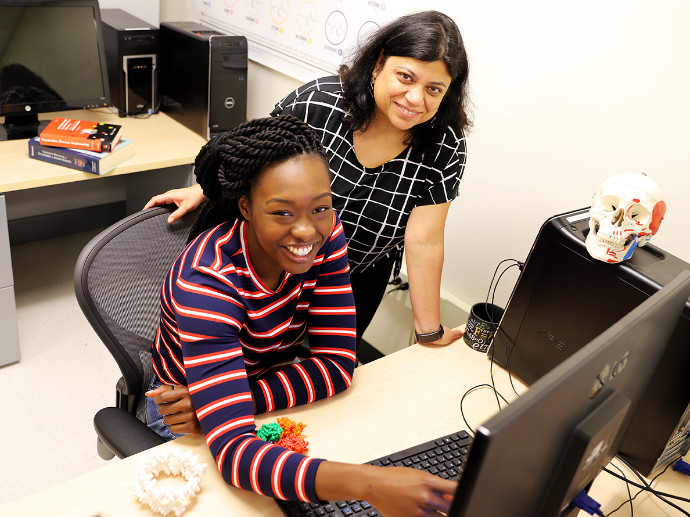Syracuse University’s ranking as a top-tier research institutiondemonstrates a perpetual commitment to creating new, diverse knowledge. And, extraordinary research does much more than produce unique scientific insight. It also sparks remarkable educational experiences and outcomes for students in every discipline.
Associate Professor Shikha Nangia’s biomedical research group in the College of Engineering and Computer Science is a prime example. In 2015, Nangia received a National Science Foundation (NSF) Faculty Early Career Development (CAREER) award to study the blood-brain barrier which blocks toxins, as well as crucial medications, from entering the brain. Her research group, which includes undergraduate and graduate students alike, uses computer modeling to identify ways to open and close the blood-brain barrier to deliver medical treatment to the brain non-invasively.

“Think of the blood-brain barrier like Velcro,” said Nangia. “On one side you have blood, and on one side you have the brain. The cells between them are jam-packed to prevent the chemicals from the blood to get into the brain. What we need to do is open up the spaces between the cells. The prongs of the ‘Velcro’ are made up of proteins, known as tight junctions. If we can understand the structure of these proteins, we can design ways to open the tight junctions when we need to get medicine through and then close them back up.”
The research group’s ever-proliferating knowledge of tight junction barriers also extends beyond the brain into other parts of the body, such as the kidneys. They have extended their research into related areas as well, such as the disruption of the blood-brain barrier due to traumatic brain injuries. No matter where their focus is directed, the work contributes another level to the college’s hands-on, experimental learning pedagogy.
Undergraduate students in the Nangia Research Group are recruited from Nangia’s classes and through multiple programs that sponsor undergraduate research at Syracuse University, including the NSF-funded Syracuse Biomaterials Institute Research Experience for Undergraduates (REU), NSF CAREER REU, the Engineering and Computer Science Leadership and Ambassador Scholars Programs, and the Louis Stokes Alliance for Minority Participation Research Program. She has welcomed 24 undergraduates into her lab in the last four years.
Inspired by the subject matter and Nangia’s approachability, alumna and current bioengineering graduate student Santita Ebangwese ’19 joined the team during the spring of her junior year. As an undergraduate researcher in Nangia’s group, she studied tight junctions in the intestines. Her work advanced the group’s research and served as Ebangwese’s honors thesis project. Her involvement in the lab was on top of an already busy schedule. Ebangwese was a member of the Syracuse Orange’s women’s volleyball team and has now joined the women’s soccer team. Despite multiple commitments, Ebangwese was recognized as a Syracuse University Scholar and 2018 ACC Volleyball Scholar-Athlete of the Year.
Ebangwese says, “Dr. Nangia acclimates students to the research by going back to the basics. She understands that we each have different levels of understanding on computational modeling, biochemistry and more. She breaks it down so everyone understands the purpose of the research, and she fosters an environment to ask questions for further understanding. My research experience contributes greatly to my understanding of bioengineering and opens doors to new possibilities in my future.”
Ebangwese, now a graduate student, is still a part of the research group. She plans to get as much research experience under her belt as she can before pursuing medical school to become an orthopedic surgeon. She isn’t the only student augmenting her education and earning recognition by contributing to Nangia’s research.
This spring, Katie Piston, a Tillman Scholar and bioengineering Ph.D. student in Nangia’s group, was awarded a prestigious NSF Graduate Research Fellowship. The fellowship is for her work to develop a computational model of tight junctions disrupted by head injuries understand chronic traumatic encephalopathy and blood-brain barrier dysfunction and help uncover better treatments for brain injuries. The highly selective fellowship program recognizes and supports outstanding graduate students in science, technology, engineering and mathematics disciplines nationally.
Piston finds a special camaraderie unites the lab. She says, “we all come from different educational and geographic backgrounds. No two students are the same, which is helpful in troubleshooting problems and bouncing ideas off each other. The weakness of one group member may be the strength of another, and the environment created promotes teaching between fellow students. We all know that the success of any one of us is a reflection of the group as a whole and therefore always help each other.”
Students whose work is funded by Nangia’s career award are also earning recognition in the broader biomedical engineering field. Nandhini Rajagopal G’16 was invited to present a computational method for generating the energy landscape of transmembrane protein association at an international Gordon Research Conference at Stonehill Collegein Easton, Massachusetts, in July.
In addition to Piston’s fellowship, Rajagopal’s presentation and Ebangwese’s Syracuse Scholar recognition, members of the research group have been winning awards and fellowships that will make them more attractive candidates for future degrees and jobs.
Flaviyan Jerome Irudayanathan G’18 earned an internship with Genentech, a noted biotechnology corporation. Huilin Ma G’15,’19 was awarded an All-University Doctoral prize and has gone on to become a postdoctoral fellow at John Hopkins University. Nangia herself received an award for Outstanding Contributions to the Student Experience and University Initiatives for enhancing the undergraduate experience for students.
Whether it’s in bioengineering or other vital disciplines offered by the College of Engineering and Computer Science, the school’s robust research activity is a pivotal contributor to the student experience and positive student outcomes.
“We are an intelligent and hardworking group of individuals,” says Ebangwese. “We’re willing to go the extra mile because that is the environment that Dr. Nangia fosters in her lab. We are successful because she cares, and so does the rest of the cohort, we work together, so everyone learns and produces work with high standards. I love being a member of this research group.”
